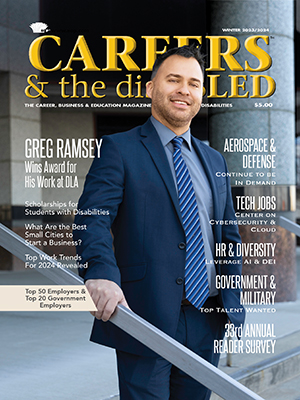| |

CAREERS & the disABLED Magazine, established in 1986, is the nation's first and only career-guidance and recruitment magazine for people with disabilities who are at undergraduate, graduate, or professional levels. Each issue features a special Braille section.
CAREERS & the disABLED has won many awards, including several media "Award of Excellence" acknowledgments from the President's Committee on Employment of People with Disabilities.
This magazine reaches people with disabilities nationwide at their home addresses, colleges and universities, and chapters of student and professional organizations through a paid subscription.

|
|
 CAREERS & the disABLED
CAREERS & the disABLED
» Featured Articles
» Subscription Information
» Reader Survey
» Companies Actively Recruiting

Eight Tips for College Grads with Disabilities Entering the Workforce
Whether you’re entering your senior year or just received your degree, it’s never too early to start preparing for what’s ahead! Tangram life coaches have assembled the following tips to make the transition from college seamless for grads with disabilities.
1. Change your Vocational Rehabilitation track. Vocational Rehabilitation (VR) is a state-administered program that supports people with disabilities in preparing for, obtaining, and retaining employment. While the name and processes may vary from state to state, each state has a similar operation. If you are enrolled in VR services in your state, then, once you graduate, be sure to inform your counselor if you intend to seek employment so they can get you on the right track in terms of support. Your counselor would need to change your VR case to Employment Track from Education Track.
2. Find the right job coach for you. With the help of your VR Counselor, identify an employment provider that will provide a job coach who has experience in or specializes in finding professional employment for individuals with four-year degrees. It’s a good idea to interview more than one employment provider and prepare a list of questions that you’d like answered so you can compare a couple of options and choose the best one for you.
3. Assemble your support team. It’s important to know who you can count on to help you with your job search. Your support team might include friends, family members, your job coach and professional contacts that can help with mock interviews or other experiences.
4. Do your research. Identify companies who have been proactive in creating cultures of inclusion by researching those companies with disability inclusion initiatives in place.
5. Communicate. Don’t be afraid to disclose your disability to a potential employer. Furthermore, if you’re bringing someone with you to an interview, such as an interpreter or job coach, be sure to notify your interviewer ahead of time so he or she can be prepared and get the most out of the interview. Be up front about any accommodations you may need to help you perform the essential functions of the job.
6. Use technology to your advantage on your job. The same adaptive technologies that you used in college can probably continue to help you on the job. Know what technologies exist, and talk with your employer about the functions of the job so you can identify which technologies may be most effective in assisting you.
7. Utilize available resources. Many graduates don’t know that their university career services are available for them to use as alumni. Continue to use the resources these departments offer, such as resume writing and review, networking opportunities, mock interviews, etc. This is a great free resource!
8. Network! It’s all about who you know. Work with your job coach or your university’s Career Services to identify networking opportunities. Getting involved with organizations as a volunteer can also lead to employment opportunities - it looks great on a resume, can help you build skills and can help you establish a bank of references and professional contacts.
–Tangram Life Coaching
About the Author: Through one-on-one coaching and a team-based support model, Tangram Life Coaching, tangramlifecoaching.org, helps young adults create and sustain positive life change, working within the individual’s environment to identify and overcome obstacles that keep him or her from creating the life he or she wants. The team-based model uniquely integrates clinical expertise, professional training and family support. Each professionally trained personal life coach partners closely with a clinical supervisor and the individual’s family to develop and help implement a Quality of Life Plan.
 » Feedback for the Editor
» Feedback for the Editor
» Request Article Copy
|
|